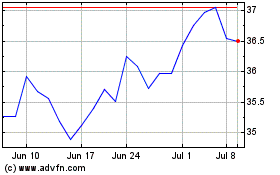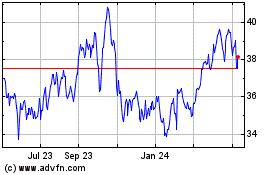By Sarah McFarlane and Christopher M. Matthews
LONDON -- BP PLC returned to profit in the fourth quarter but
said the pandemic, which battered the oil-and-gas industry in 2020,
would continue to challenge its business this year.
Covid-19 has sapped demand for oil, hitting prices, and prompted
the world's biggest energy companies to slash spending, cut jobs,
write down the value of their assets and -- in the case of BP and
Royal Dutch Shell PLC -- lower dividends. The crisis led U.S. oil
giants Exxon Mobil Corp. and Chevron Corp. to discuss a merger,
according to people familiar with the matter, although the talks
didn't progress.
BP said Tuesday its earnings had suffered from weaker gas
marketing and trading results, while refining margins and
utilization remained under pressure. However, this was partly
offset by income from asset sales, including some proceeds from the
$5 billion sale of its petrochemicals business to Ineos Ltd.
The company reported a replacement cost profit -- a metric
similar to the net income figure that U.S. oil companies report --
of $825 million for the three months ended Dec. 31, from a loss of
$4 million in the year-earlier period. For the full year, it
reported a loss of $18.1 billion, from a profit of $3.5 billion in
2019.
BP said Covid-19 restrictions would continue to sap demand early
in 2021 and that the pandemic may have an enduring impact on the
global economy, with the potential for weaker demand for energy for
a sustained period.
Still, Chief Executive Bernard Looney said the company expects
demand to stabilize this year, although the speed and degree of the
recovery is uncertain.
"It's all dependent on vaccine rollouts, vaccine efficacy and
OPEC compliance," Mr. Looney said in an interview. Unlike its U.S.
counterparts, Mr. Looney said that BP hadn't spoken to any of its
peers about mergers, and that it was focused on executing its
strategy to pivot toward low-carbon energy.
BP's shares traded 3.1% lower in London on Tuesday as the
results came in below analysts' expectations.
Other oil companies are also feeling the strain. Last week,
Chevron Corp. reported a quarterly loss, capping its worst annual
performance since 2016.
Exxon is expected to report a fourth consecutive quarterly loss
later Tuesday, followed by Shell's earnings on Thursday. Both
companies have signaled large write-downs, with Exxon expected to
reduce the value of certain assets by as much as $20 billion.
The pandemic has already triggered the largest revision of the
value of oil-and-gas assets in at least a decade, as companies sour
on costly projects amid the prospect of low prices for years.
BP has suggested demand for fossil fuels may never fully recover
and that the pandemic could accelerate the pace of transition to a
lower-carbon economy.
Under Mr. Looney, BP has embarked on a plan to reduce its
dependence on oil and gas, while increasing investments in
low-carbon energy like wind and solar power.
French energy giant Total SE has also outlined plans to build up
its renewables business, while Shell has signaled its intention to
set out a similar path later this month.
"An unprecedented demand collapse has forced the hand of Big Oil
to right-size their dividends and capital frames; meanwhile plans
for energy transition have been accelerated," said Christyan Malek,
an analyst at JPMorgan.
However, Exxon and Chevron haven't set out plans to invest
substantially in renewables, instead choosing to double down on oil
and gas. Both companies have argued that the world will need vast
amounts of fossil fuels for decades to come, and that they can
capitalize on current underinvestment in oil production.
The U.S. companies plan to invest in carbon capture and storage,
which gather carbon emissions from industrial processes, or
directly from the air, and deposit them underground. Some see such
technology as a way to lower the carbon footprint of fossil fuels,
potentially allowing producers to continue pumping oil and gas as
some countries tighten regulations on emissions.
On Monday, Exxon said it would form a business unit focusing
exclusively on technologies to reduce carbon emissions, investing
about $3 billion through 2025, primarily on carbon-capture
projects.
Rebecca Fitz, a senior director at Boston Consulting Group, said
she thinks both the European and American strategies can work, but
both must deliver better returns and produce less carbon to be
palatable to investors.
"When you have less capital, choices around how you allocate
that capital are more stark," Ms. Fitz said.
Exxon's shares have fallen nearly 28% over the past year, with
Chevron's down about 19%. BP and Shell have fared worse, with
shares down 42% and 37%, respectively. Investors have expressed
more faith in Chevron because it entered the downturn with a
stronger balance sheet than its peers.
To bolster its finances, BP has been selling assets to reduce
debt. The company said it was now more than halfway to its target
of $25 billion of asset sales by 2025, helped Monday by the sale of
a 20% stake in a gas development in Oman. BP aims to lower its debt
to $35 billion by the first quarter of next year, down from $39
billion at the end of 2020.
Write to Sarah McFarlane at sarah.mcfarlane@wsj.com and
Christopher M. Matthews at christopher.matthews@wsj.com
(END) Dow Jones Newswires
February 02, 2021 06:21 ET (11:21 GMT)
Copyright (c) 2021 Dow Jones & Company, Inc.
BP (NYSE:BP)
Historical Stock Chart
From Mar 2024 to Apr 2024

BP (NYSE:BP)
Historical Stock Chart
From Apr 2023 to Apr 2024
